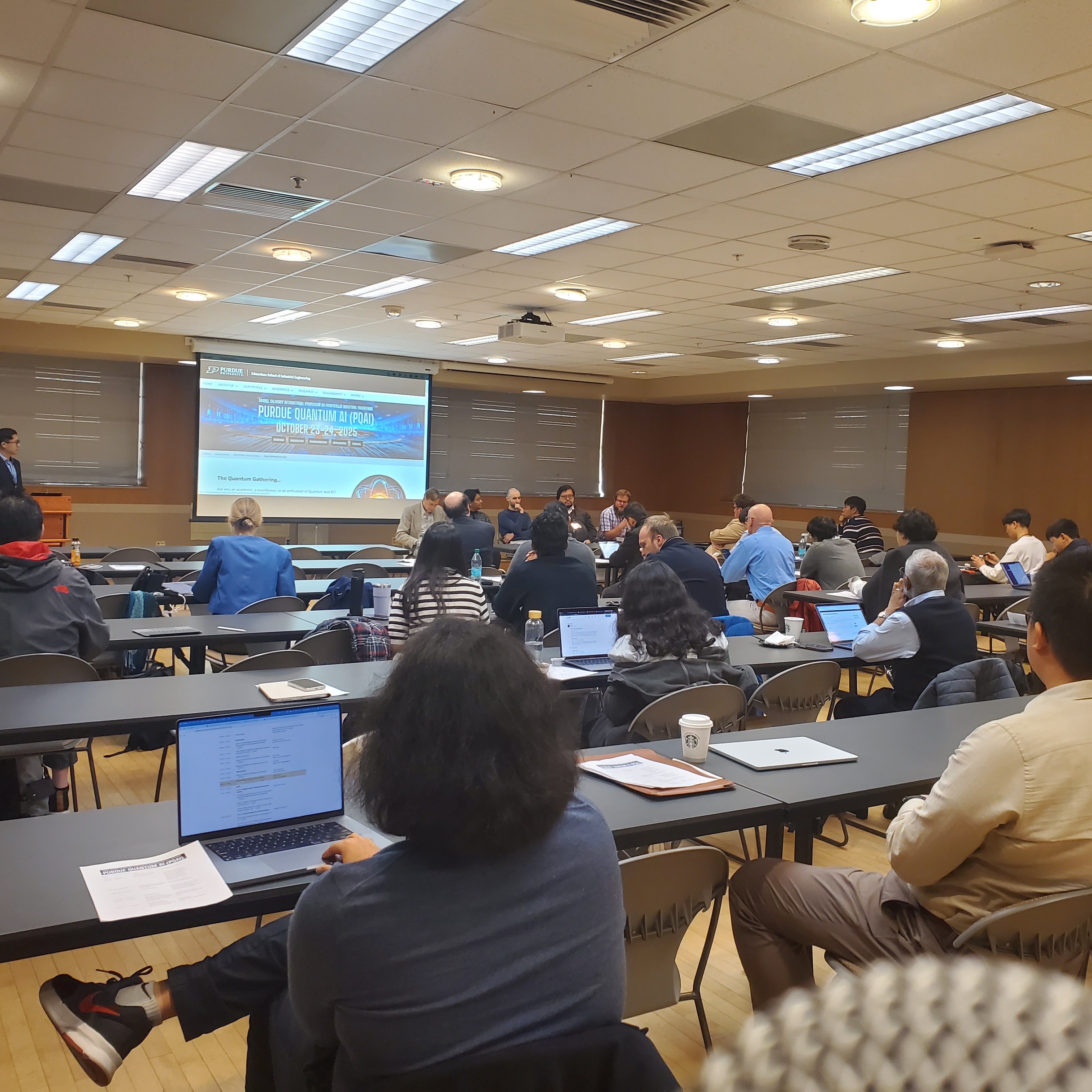Purdue Hosts Quantum AI Symposium
Exploring the Human and Technological Frontiers of Quantum Computing and Artificial Intelligence
Highlighting advances at the intersection of computing and intelligence, the 2025 Purdue Quantum AI (PQAI) Symposium brought together leading researchers, students, and industry professionals for two days (October 23–24) of discussions on the fast-emerging convergence of quantum computing and artificial intelligence.

The symposium served as the 2025 installment of the Gavriel Salvendy International Symposia on Frontiers in Industrial Engineering (GSIS-FIE) series — a collaborative initiative designed to foster dialogue on the profession’s evolving frontiers and its global impact. Hosted in person at Purdue University in West Lafayette, Indiana, PQAI 2025 provided a vibrant platform for sharing contributions and visions from across the world’s leading minds in quantum computing, optimization, reinforcement learning, quantum machine learning, and algorithms.
The event featured wide-ranging sessions on topics such as quantum machine learning, optimization, and the foundations of quantum information, offering participants a forum to exchange ideas shaping the next generation of intelligent systems. A particularly forward-looking theme unique to PQAI 2025 was its exploration of human-centered perspectives in quantum computing, emphasizing how quantum concepts intersect with cognition, design, and human–computer interaction.
“Quantum AI is advancing at an extraordinary pace, driven by rapid progress in quantum algorithms, quantum hardware, and scalable hybrid architectures,” said Vaneet Aggarwal, Professor and symposium co-chair. “The symposium showcased breakthroughs in quantum machine learning, quantum optimization, and quantum-enhanced decision-making, areas where quantum resources enable fundamentally new computational capabilities. As these methods mature, we anticipate transformative impacts across intelligent systems, from faster training of quantum neural models to more expressive generative and reinforcement learning frameworks.”
“Quantum technologies are rapidly advancing. It’s critical to consider the human factors that influence, and are influenced by, these systems,” said Denny Yu, associate professor and symposium co-chair. “Presentations such as Using Quantum Probability to Understand Contextual Reasoning, Roles of Human-Computer Interaction for Quantum Computing, Quantum-enhanced Machine Theory of Mind, and Human Factors of Quantum Modeling and Computing reflected how deeply human considerations are connected into this new technological frontier.”
The symposium welcomed an impressive roster of distinguished, keynotes, and invited speakers, including Jerome Busemeyer, Bob Coecke, Samuel Yen-Chi Chen, Swati Gupta, Giacomo Nannicini, Ken Robbins, Shouvanik Chakrabarti, Rebekah Herrman, Hyeok Kim, Jiaqi (Jimmy) Leng, Gokul Subramanian Ravi, Ruizhe Zhang, Joongheon Kim, and Takao Tomono, who shared insights into breakthroughs and challenges shaping the future of the field.
Opening remarks were delivered by Arvind Raman, John A. Edwardson Dean of the College of Engineering; Young-Jun Son, head of the Edwardson School of Industrial Engineering; representatives from the Purdue Quantum Science and Engineering Institute (PQSEI); and members of the Gavriel Salvendy International Symposium on Frontiers in IE (GSIS) committee. The symposium was co-chaired by Vaneet Aggarwal, David Esteban Bernal Neira, and Denny Yu.

PQAI 2025 attracted international participants spanning academia and industry. A total of 22 papers were submitted through OpenReview.net for peer evaluation, with 14 accepted for presentation and 4 for poster sessions. A separate late-breaking call yielded 13 poster submissions, 12 of which were accepted. Contributions were reviewed by at least two technical program committee members, reflecting the symposium’s rigorous review and selection standards.
The proceedings highlight three major areas of research:
• Part I: Quantum Machine Learning and Models – covering frontiers in quantum neural networks, variational quantum algorithms (VQE), and quantum reinforcement learning (QRL).
• Part II: Quantum Optimization and Linear Systems – exploring new methods for complex problems like QAOA and QUBO and hybrid quantum-classical approaches.
• Part III: Quantum Cognition and Human-Centered Computing – focusing on the cognitive and human-factor implications of quantum modeling, explainable quantum AI, and real-world applications.
We extend our deepest gratitude to the invited guests, paper contributors, and symposium attendees for their inspiring discussions and meaningful engagement around the rapidly evolving frontier of quantum AI. We also express our sincere appreciation to the GSIS-FIE committee and the program committee for their dedicated support. Special thanks are due to Purdue Conferences (Erica D. Wilson and team) for their assistance in organizing the symposium and to the Purdue IE staff (including Abigail Rhee, Julia Sibley, and David Montgomery) for their support with website management. The valuable insights and suggestions provided by all contributors were instrumental in enhancing the clarity and overall consistency of this volume.
Finally, we thank our generous sponsors, Dr. Gavriel Salvendy, Purdue University Edwardson School of Industrial Engineering, and D-Wave Quantum Inc.
The symposium’s success underscored Purdue’s growing leadership in the Quantum × AI domain — and its commitment to fostering the human, computational, and collaborative dimensions of innovation at this emerging frontier.
